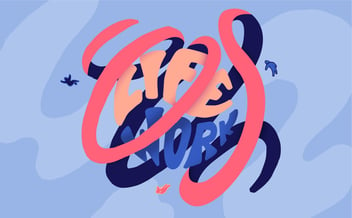
How vulnerability can uncover your strengths, grow emotional connectivity—
and even help create more inclusive cultures.
It was a workday.
I was sitting in front of a closed laptop at home, about to join a meeting that would decidedly change the fate of our company—for good or ill.
But before explaining how that meeting went, let me highlight some of the events that landed us in such a precarious situation.
Our company is based in Houston—where oil and gas are king of the industrial landscape, our client list too. At this point, March 2020, the price of a barrel of oil was about $31, down from $57 in January (it would bottom out at $18 during May). Ouch.
With 80% of our revenue coming from the oil and gas sector, we were in trouble. Clients were cancelling projects, exercising clauses in contracts I never knew existed—and our projected cash runway went from no sweat, to sweating bullets.
Then there was COVID-19, which was materializing into a far greater threat to human health than initially thought. Forget the impact on business, we needed to do our part to flatten the curve. So, we followed the guidelines outlined by the experts—taking our workspace into the virtual world.
I believe in being fully transparent about the business’s finances, status, and strategic direction. I owe it to my employees—I see it as their business, too.
The purpose of this meeting was to brief the entire company, transparently, about: our finances (they looked bleak), the status of our workforce (60% will be furloughed)—and our strategic response to the economic crisis (we didn’t really have one, not yet).
So, I lift open the laptop, scroll through my calendar, find the Google Hangout link—take a deep breath—and choose to “Join now”.
Being transparent about the objective facets of our business, the facts, is relatively straightforward. Still plenty gut-wrenching, but straightforward. However, as I look at my work family’s 170 plus faces trapped in their respective worlds on a screen, managing my emotions becomes otherworldly.
That’s because being emotionally transparent, being vulnerable—and showing your humanity is much, much more difficult. It leaves us exposed—there is a fear that people’s perspective of us will shift negatively, and their faith in our ability to lead will be irrevocably diminished.
That fear is justified, it’s very real—but vulnerability is not your weakness. It is one of your greatest strengths, and one I believe was substantial and meaningful in our company’s ability to come back stronger and even more cohesive.
There’s power in humanity—show it.
Vulnerability matters
As a leader, being in a vulnerable space is difficult, and it can be scary. And shifting the behaviors and culture in your company to be one that doesn’t just accept, but encourages vulnerability is an even greater challenge.
It might seem easier and neater to just check everything at the door when you switch from life-mode to work-mode—less “baggage” to deal with.
Do not fall into this trap. It’s inhumane, unreasonable, unfair—and bad for business. If you want to grow as a leader, bolster greater emotional connectivity, and create a more just and inclusive culture, remember: vulnerability matters.
(Help!) You know I need somebody
As a leader, you should know. And you can’t ask questions, ask for help—or phone a friend. You should just know.
You hear how ridiculous that sounds, right?
Being a leader isn’t about having all the answers, it’s about the role you play in finding those answers. Your not knowing isn’t a weakness, your asking for help is not a sign of being lost—but letting your ego interfere with your growth and deny people the opportunity to help you is a weakness.
From your vulnerability comes strength and growth.
I’m human, you’re human—let’s be human together
Vulnerability leads to authenticity—when you allow your team to see you’re human, it serves as a sort of permission for others to be vulnerable too (not that they need permission).
Your vulnerability speaks volumes, it says, “hey, I’m human, you’re human—let’s be humans together.” This idea, that vulnerability begets vulnerability, is what builds emotional connectivity.
Emotional connectivity bonds people and teams together. It gives people a sense of belonging, like they are contributing to an organization that values their skill and savvy—and empowers them to be their most authentic selves.
Vulnerability brings humans together.
Empowering people with their voices
If you’ve ever been the victim of bias, prejudice, or any inequitable behavior in the workplace, you know how hard it is to unveil that behavior. To voice your feelings and make your mistreatment known.
There is the fear of ridicule and gaslighting, or reprisal and jeopardy (gaslighting is the act of manipulating or forcing a person to question the legitimacy of their grievances and sanity)—speaking out takes bravery, conviction, and a lot of vulnerability. It is really hard—these conversations by nature are extremely uncomfortable.
But what if we could make it easier—what if we could make that position of vulnerability just a little easier?
As leaders, I think we can.
Our ability to be vulnerable sets the expectation that it is okay to be vulnerable and human in the workplace. And when someone has the courage to be vulnerable, we need to be vulnerable too. We do not minimize, get defensive, or put up barriers—rather we listen with empathy and sincerity.
Vulnerability is akin to empowerment. It is the key to letting people’s voices be their greatest power, and a force for change.
Vulnerability pairs well with Agile
Imagine a team member is falling behind on their workload—maybe suffering at home.
What if instead of that employee grinding through it alone, and potentially missing delivery, they were vulnerable. What if they were transparent about their situation and asked for help?
Odds are, that work would be taken on by someone else or it would be reprioritized. You could then begin working together with that employee to find a solution that works best for them and their team.
The highest-performing teams and the most well-oiled Agile organizations understand that vulnerability isn’t simply necessary to overcoming obstacles, but essential to being supportive and solutions-focused.
It's less about business agility, and more about emotional agility.
“Vulnerability without boundaries, is not vulnerability”
“Vulnerability without boundaries, is not vulnerability.”
That’s a quote from the humanity-workplace-guru, Dr. Brené Brown’s book, Dare to Lead. I think this quote, or concept, is an important caveat to vulnerability.
As a leader, you need to establish boundaries about what is acceptable to share, and you need to be respectful of the boundaries other people establish. Vulnerability is not an avenue to gain pity or manipulate people into behaving a certain way, or sharing something they are not comfortable sharing.
When a leader is vulnerable in a manner that is honest and respectful, it can have a massively positive impact on an organization. However, when vulnerability is forced or violates personal and professional boundaries, it is quite simply inappropriate.
Gone are the days of bottling it up, burying those emotions deep down, writing angry letters addressed to the trash can—and biting your tongue.
You know why?
Because we’re all human—every single one of us—women, trans, Muslims, blacks, gays, men, Jews, and sufferers of ovophobia. We’re human—and yet, we allow biases, insecurities, and fear deter us from being our truest selves and celebrating genuine cultural inclusion in the workplace.
Modern leaders (everyone is a leader): There is power and value in your humanity—and ignoring or suppressing it in the workplace is bad for business, and it’s bad for people.
That is why vulnerability matters.




